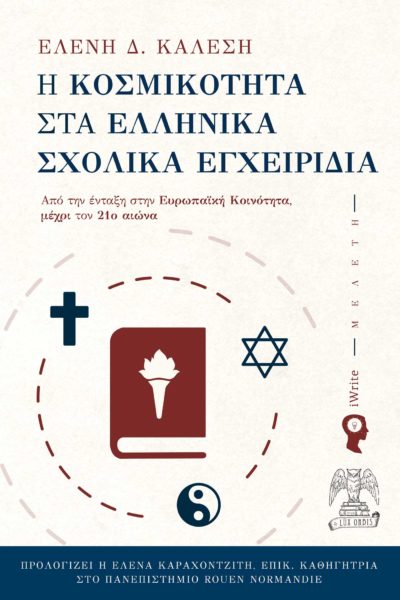Από την ίδρυση του νεοελληνικού κράτους τον 19ο αιώνα, η εκπαίδευση φαίνεται να είναι εμποτισμένο με την ορθόδοξη θρησκεία. Αυτό αποδεικνύεται, εκτός των άλλων, και από την πρωινή προσευχή που πραγματοποιείται υποχρεωτικά στον αύλειο χώρο του σχολείου.
Πώς προκύπτει, όμως, αυτή η έντονη παρουσία του ορθόδοξου στοιχείου στο ελληνικό σχολείο; Σχετίζεται με τη θέση που κατέχει η «επικρατούσα» θρησκεία στο Σύνταγμα και την εφαρμογή της στην ελληνική εκπαίδευση;
Γράφει η συγγραφέας Ελένη Καλέση (βιβλίο «Η κοσμικότητα στα ελληνικά σχολικά εγχειρίδια»)
Η Ορθοδοξία στο Σύνταγμα
Η επίκληση στην ορθόδοξη πίστη κάνει την εμφάνισή της μέσα στο ελληνικό Σύνταγμα ήδη από το προοίμιό του «Εις το όνομα της Aγίας και Oμοουσίου και Aδιαιρέτου Τριάδος» και συμπληρώνεται από το άρθρο 3, που αναγνωρίζει τη θρησκεία της Aνατολικής Oρθόδοξης Eκκλησίας του Xριστού ως την «επικρατούσα θρησκεία» του Κράτους. Σύμφωνα με το άρθρο 16 του ελληνικού Συντάγματος, η θρησκευτική διαπαιδαγώγηση θεωρείται υποχρέωση της ελληνικής εκπαίδευσης.
Η γενική αναφορά της δεύτερης παραγράφου στην ανάπτυξη της θρησκευτικής συνείδησης ως έναν από τους σκοπούς της παιδείας δε φαίνεται ούτε να καθορίζει τα μέσα εξέλιξης αυτής ούτε να την ταυτίζει με μια συγκεκριμένη πίστη. Αντίθετα, φαίνεται ότι επιτρέπει στον εκάστοτε νομοθέτη να προσδιορίσει τις λεπτομέρειες της διάταξης.
Ωστόσο, ο Ν. 1566/1985 διευκρινίζει ότι «Σκοπός της πρωτοβάθμιας και δευτεροβάθμιας εκπαίδευσης είναι οι μαθητές […] να γίνονται ελεύθεροι και […] να διακατέχονται από τα γνήσια στοιχεία της ορθόδοξης χριστιανικής παράδοσης» την ίδια στιγμή που διασφαλίζει το απαραβίαστο της θρησκευτικής συνείδησης: «Η ελευθερία της θρησκευτικής τους συνείδησης είναι απαραβίαστη»!
Περαιτέρω, η απόφαση 3533/1986 του Συμβουλίου της Επικρατείας ορίζει ότι, εφόσον η πλειονότητα των Ελλήνων μαθητών είναι χριστιανοί ορθόδοξοι και η ανάπτυξη της θρησκευτικής συνείδησης είναι ένας από τους στόχους της εκπαίδευσης, πρέπει να ακολουθούν τις αρχές της ορθόδοξης θρησκείας σε όλη τη διάρκεια της σχολικής ζωής τους, όπως τη συμμετοχή στην πρωινή προσευχή. Μάλιστα από το 1977, οι εγκύκλιοι και το Π.Δ. 201 που έχουν δημοσιευτεί ορίζουν τον υποχρεωτικό χαρακτήρα της προσευχής για όλους τους μαθητές και τους εκπαιδευτικούς, δίνοντας το δικαίωμα της απαλλαγής στους μη ορθοδόξους μαθητές μετά από γραπτή αίτηση των γονέων τους.
Οι απαλλαγμένοι από την προσευχή μαθητές είναι, ωστόσο, υποχρεωμένοι να «σέβονται τους συμμαθητές τους και να τηρούν απόλυτη ησυχία» εφόσον φτάσουν στο σχολείο πριν από την πρωινή προσευχή. Από την άλλη πλευρά, οι εκπαιδευτικοί, ορθόδοξοι και μη, είναι αναγκασμένοι να είναι παρόντες κατά την καθημερινή προσευχή για να επιβλέπουν την τάξη τους.
Φαίνεται, λοιπόν, ότι ο χαρακτήρας αυτών των νομοθετικών διατάξεων αντιτίθεται και παραβιάζει άρθρα ευρωπαϊκών συμβάσεων, όπως το άρθρο 2 του Πρόσθετου Πρωτοκόλλου της Ευρωπαϊκής Σύμβασης Ανθρωπίνων Δικαιωμάτων (δικαίωμα στην εκπαίδευση) το οποίο ορίζει ότι: «Παν Κράτος εν τη ασκήσει των αναλαμβανομένων υπ’ αυτού καθηκόντων επί του πεδίου της μορφώσεως και της εκπαιδεύσεως θα σέβεται το δικαίωμα των γονέων όπως εξασφαλίζωσι την μόρφωσιν και εκπαίδευσιν ταύτην συμφώνως προς τας ιδίας αυτών θρησκευτικάς και φιλοσοφικάς πεποιθήσεις» (σελ. 38).
Λαμβάνοντας υπόψη όλα τα παραπάνω στοιχεία, το αποτέλεσμα είναι μια αναπόφευκτη σύγκρουση μεταξύ του δικαιώματος των γονέων να επιλέγουν τον τύπο εκπαίδευσης των παιδιών τους σύμφωνα με τις προσωπικές τους πεποιθήσεις και της κρατικής αποστολής για την ανάπτυξη της θρησκευτικής συνείδησης στα παιδιά.
Μερικοί νομικοί δεν έχουν την ίδια άποψη: ο Πρόδρομος Δαγτόγλου υποστηρίζει ότι η σύγκρουση μεταξύ της προστασίας των θεμελιωδών δικαιωμάτων και της κυριαρχίας της ορθοδοξίας στο σχολικό περιβάλλον αποφεύγεται μέσω του συνταγματικού άρθρου 13 για την ελευθερία της θρησκευτικής συνείδησης και τη δυνατότητα εξαίρεσης από όλες τις σχολικές θρησκευτικές εκδηλώσεις κατόπιν αιτήματος. Ωστόσο, η πρακτική της απαλλαγής προκαλεί πολλές αντιδράσεις, καθώς ορισμένοι, όπως ο Χρυσόγονος, κάνουν λόγο για στιγματισμό και μεροληπτική μεταχείριση μαθητών που έχουν διαφορετικές πεποιθήσεις, ενώ άλλοι υποστηρίζουν ότι η απαλλαγή δεν παραβιάζει το δικαίωμα της θρησκευτικής ελευθερίας και των ίδιων των μαθητών.
Θρησκεία & εκπαίδευση: Η σύγχρονη και η παραδοσιακή ερμηνεία
Η θέση της επικρατούσας θρησκείας στο ελληνικό Σύνταγμα και τους θεσμούς του αποτελεί το «μήλον της έριδος» στον κόσμο των νομικών. Οι απόψεις που έχουν διατυπωθεί για τον ρόλο του στη «θρησκευτική ανάπτυξη των Ελλήνων» διίστανται δημιουργώντας έντονη πόλωση. Ορισμένοι ειδικοί δίνουν στην ορθοδοξία έναν παραδοσιακό χαρακτήρα, ενώ άλλοι επιμένουν στην πιο σύγχρονη ερμηνεία της.
Ο Σωτηρέλης εισάγει την πρώτη παραδοσιακή άποψη γύρω από την ορθοδοξία και τον μονοδιάστατο και χειριστικό χαρακτήρα της στη θρησκευτική εκπαίδευση. Προβάλλει το επιχείρημα της προνομιακής της θέσης προς τιμήν του «κρίσιμου ρόλου» που έπαιξε στη διαμόρφωση της ελληνικής ταυτότητας. Έτσι, η ορθόδοξη πίστη και ο Ελληνισμός παρουσιάζονται ως μια αδιάσπαστη οντότητα, γνωστή ως «ελληνοχριστιανικός πολιτισμός».
Η Ορθόδοξη Εκκλησία αναλαμβάνει τον προστατευτικό ρόλο αυτού του πολιτισμού και, ως εκ τούτου, το δόγμα της αποτελεί το μοναδικό αντικείμενο θρησκευτικής εκπαίδευσης για τους Έλληνες μαθητές.
Η σύγχρονη ερμηνεία στηρίζεται στον δηλωτικό χαρακτήρα της επικρατούσας θρησκείας ως θρησκεύματος της συντριπτικής πλειοψηφίας του ελληνικού λαού. Στην ίδια γραμμή, ο Δαγτόγλου δηλώνει ότι η προστασία της ορθόδοξης θρησκείας έχει ιστορική σημασία, που υποδηλώνει τον αντιθρησκευτικό χαρακτήρα του Κράτους, χωρίς φυσικά να εγκαταλείπει τη θρησκευτική του ουδετερότητα.
Σε αυτή τη βάση, τα προνόμια που αποδίδονται στην ορθοδοξία δικαιολογούνται. Επιπλέον, ο Φουντεδάκης υποστηρίζει ότι η επικρατούσα θρησκεία της Ελλάδας δεν αναγνωρίζεται ως επίσημη ή κρατική θρησκεία, όπως η Αγγλικανική Εκκλησία ή η Λουθηρανική Εκκλησία της Δανίας.
Αν και το άρθρο 13 του ελληνικού Συντάγματος κατοχυρώνει την ελευθερία της θρησκευτικής συνείδησης για «κάθε γνωστή θρησκεία», καθώς και την απόλαυση των ατομικών και πολιτικών δικαιωμάτων ανεξαρτήτως θρησκευτικών πεποιθήσεων των πολιτών, γίνεται αντιληπτό πως η «επικρατούσα» θρησκεία του Κράτους, με την παραδοσιακή ή σύγχρονη ερμηνεία της, διατηρεί αδιαμφισβήτητη την υπεροχή της μέσα από την εφαρμογή της πρωινής υποχρεωτικής προσευχής στο ελληνικό σχολείο.
Για την θρησκεία και την εκπαίδευση στην Ελλάδα αναζητήστε περισσότερα


